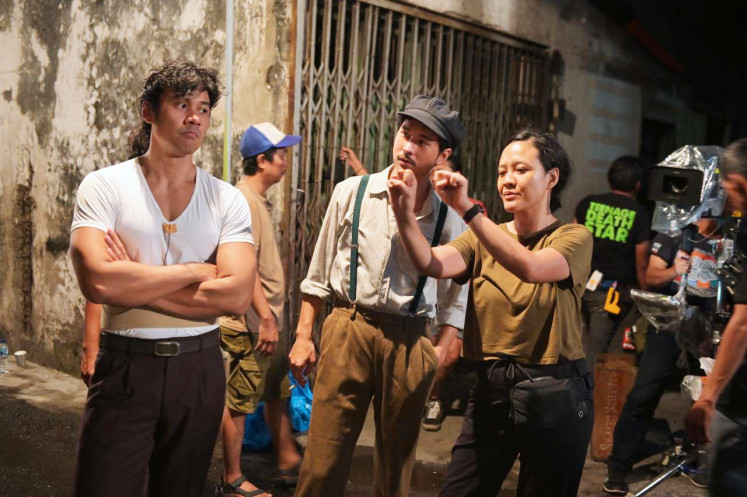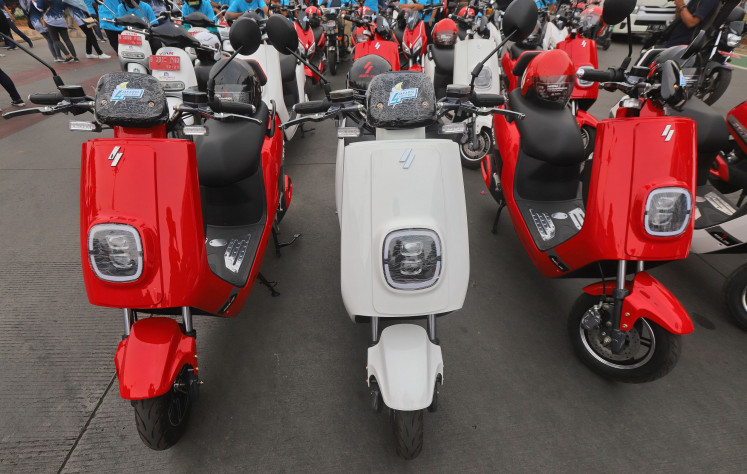Stunning Virtuosity: Taiwanese ensemble's dedication to percussion
The concert featured six works out of 230 commissioned and tailor-made pieces for the percussion troupe over more than three decades.
Change text size
Gift Premium Articles
to Anyone
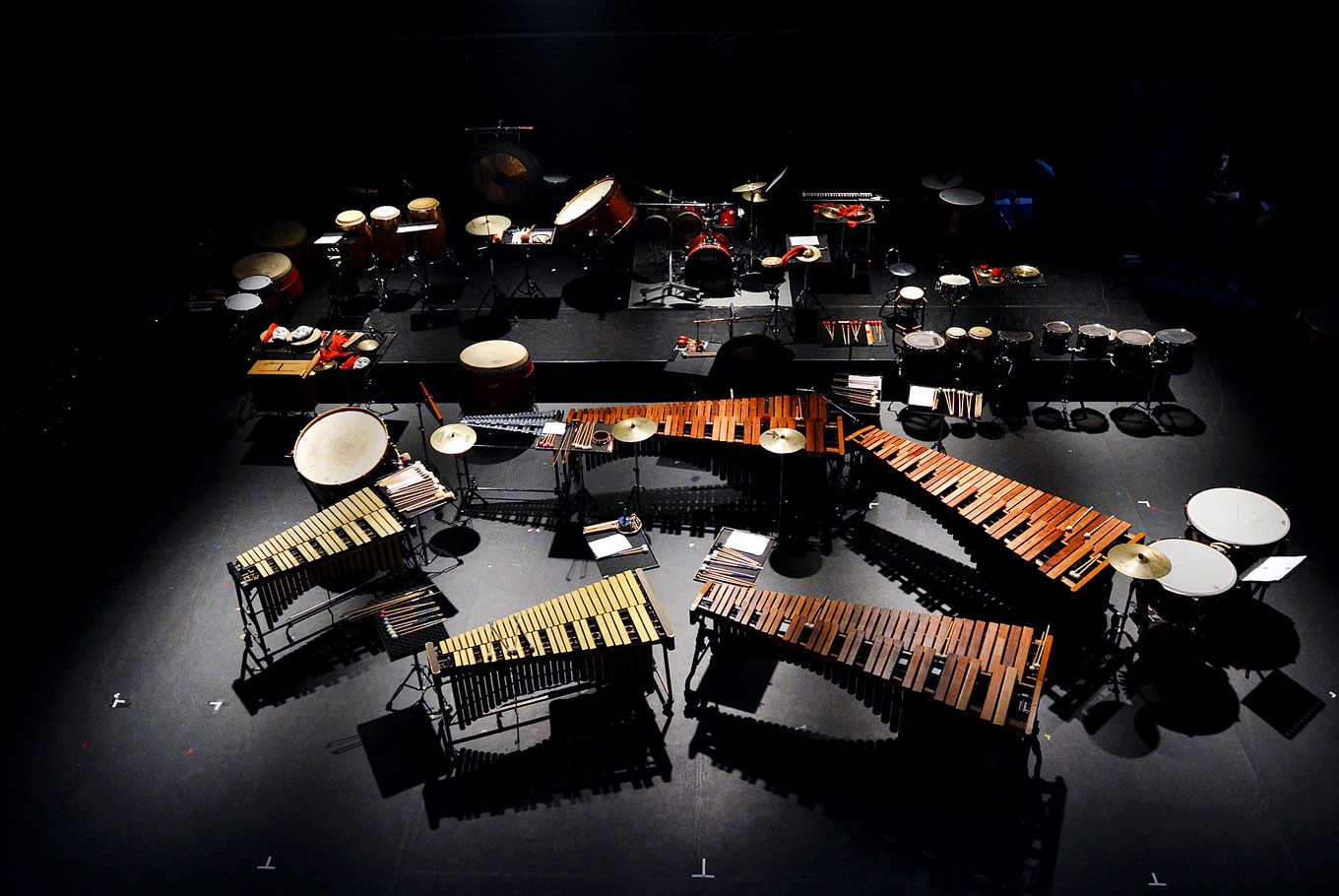 After performing in more than 30 countries, Taiwan’s first percussion ensemble, Ju Percussion Group, finally made its first stop in Indonesia since the group’s formation in 1986 for its two-day percussion concert, Stunning Virtuosity. (Salihara Community/Witjak Widhi Cahya)
After performing in more than 30 countries, Taiwan’s first percussion ensemble, Ju Percussion Group, finally made its first stop in Indonesia since the group’s formation in 1986 for its two-day percussion concert, Stunning Virtuosity. (Salihara Community/Witjak Widhi Cahya)
A
fter performing in more than 30 countries, Taiwan’s first percussion ensemble, Ju Percussion Group, finally made its first stop in Indonesia since the group’s formation in 1986 for its two-day percussion concert, Stunning Virtuosity.
The concert took place at the Salihara Community’s black box theater in South Jakarta as a part of the community’s International Performing-arts Festival (SIPFest) 2018, which runs from Aug. 4 to Sept. 9.
The percussion act was based on contemporary Western percussion music, while also highlighting Taiwanese culture rooted from Chinese, Taiwanese-aboriginal and Japanese influences.
The concert featured six works out of 230 commissioned and tailor-made pieces for the percussion troupe over more than three decades.
Tony Prabowo, Salihara’s music and dance curator, said the community often invited many Western musicians, but for this year’s festival, it decided to invite more Asians.
“Ju [Percussion Group] represents Asia as one of the strongest performing groups,” Tony said.
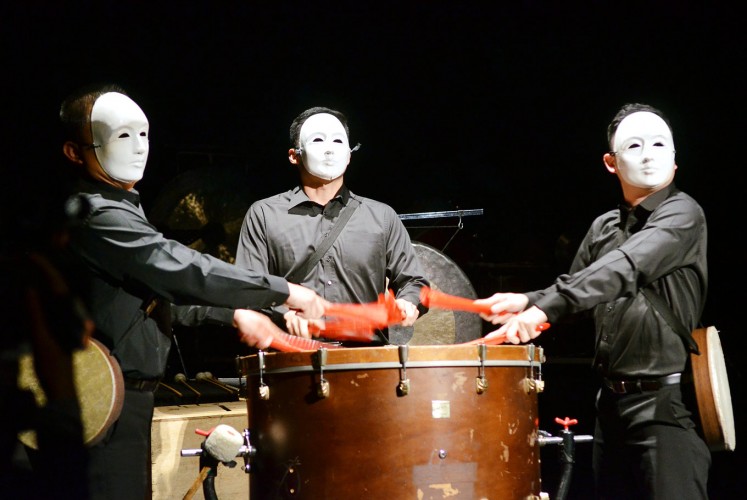
“One of our goals is the novelty, something new and contemporary, and Ju is the right representative.”
According to Tony, Ju Percussion Group’s music is lighter and easier to digest for common people and non-musicians, although it does not reduce its contemporary essence. He also praised the group’s musical dynamics, cohesion, precision, as well as its mallet percussion technique.
Founded by Austrian-educated Ju Tzong-Ching in 1986, the percussion troupe currently has 15 musicians and a composer in residence. Growing up in the countryside, Tzong-Ching used to listen to traditional music played in the temple as a child, and for him that kind of music was a part of daily life.
Tzong-Ching said percussion was a very interesting category of music, as it enables him to collaborate with other performing arts such as dance and theater in order to make the music richer.
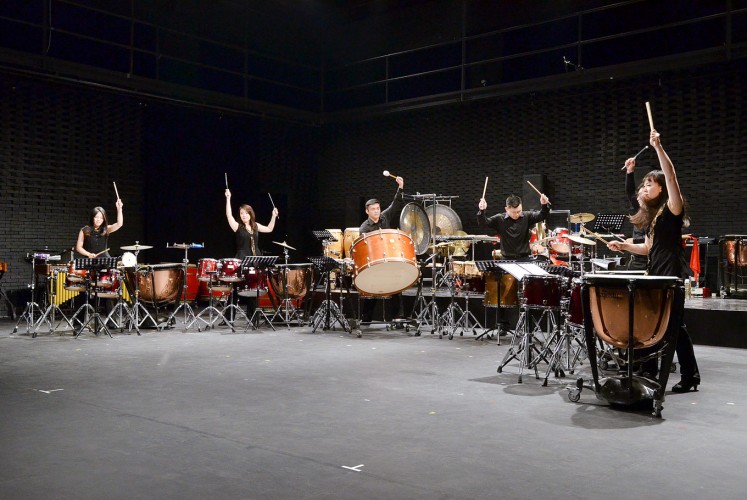
Starting off the 90-minute concert was a mallet percussion piece of “3 Epilogues” by Gérard Lecointe of France, which was based on symphonic traditional Western music. It began with musicians hitting the marimba using two to four mallets in a slow tempo with small drumbeats in the background. As the song progressed, the tempo then went faster and the music got louder.
The next piece was “Zhong Kui Marrying His Sister Off” by Liu Yu-Yun, which was inspired by a Chinese folktale and had Peking opera music for the piece. Taiwan’s national artist Peiling Zhong of the Taipei Chinese Orchestra joined the stage, this time plucking her pipa, a short-necked flute that is a Chinese traditional musical instrument. Meanwhile, other musicians accompanied herpipa playing with sounds of the marimba, Chinese bass drums, cymbal and gong.
Another piece performed by the group was “Solar Myth” by Chang Chiung-Ying, which drew inspiration from some Taiwanese-aboriginal tribes’ shared legends. It began with three musicians wearing white masks, who pounded a single large bass drum together with red folding fans.
Later on, the percussion ensemble’s founding member Pei-Ching Wu carried a red umbrella, approached them and soon repeatedly hit the marimba with three mallets. The masked musicians followed suit by beating both the drum’s frame and surface, before hitting the marimba competitively with her.
“J Effect” by Lu Huan-Wei was the fourth song on the list and was performed simply with the percussionists beating the bass drums without being accompanied by other musical instruments.
For the fifth song, “Espiritu Libre” by Stephen Whibley, the group took a different approach by combining African and Latin-American rhythms including Brazilian samba, Argentinian tango and Cuban cha-cha. The group played the drums, percussion mallet, maracas and triangle in order to bring the sounds alive.
Moving on to “Drumming Fest” by Ho Hong-Chi, the final piece of the night, the percussionists returned to their Chinese roots. The percussionists beat large drums, while other percussionists stood behind with their lion dance cymbals. In addition to playing the music, the drummers also threw their drumsticks high in the air and to the drummers beside them, making it a theatrical act at the same time.
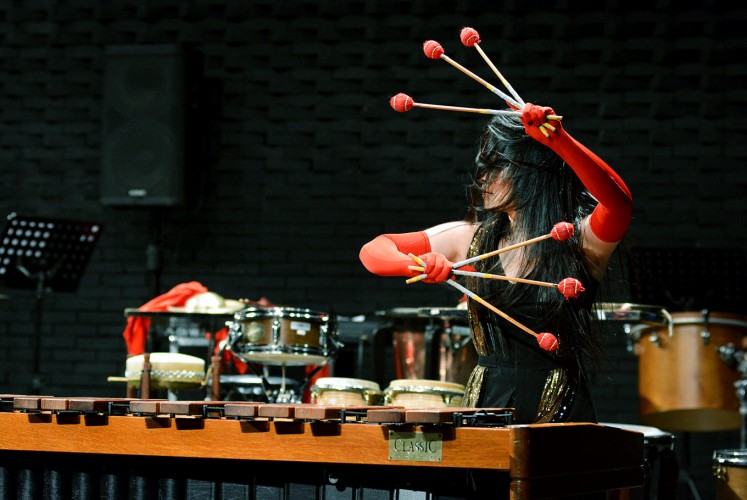
After completing their six works, the group delivered more percussion through their “The Body Language” piece without any musical instruments at all. They clapped their hands, stomped their feet and slapped their thighs and chests.
It was not the end of the performance until they beat their drums once more. Throughout the middle to the end of the concert, Ju Percussion Group received more than one standing ovation.
Hwang Kuen-Yean, one of the musicians who became a member of the Ju Percussion Group in 1988, said a group rehearsal involved four hours of rehearsal every day from Monday to Friday as a full-time job. However, that doesn’t include personal practice with one’s own musical instrument, which is done outside of the regular group rehearsal. If the Ju Percussion Group was about to have an international concert or a new project with a symphony orchestra, the group would spend more time practicing.
While Kuen-Yean mostly plays the drum, he and his fellow musicians were trained to play everything, although it is hard to say what instrument one particular group members plays because everyone plays everything.
“That’s also the best part of percussion,” he told The Jakarta Post. “When the composer is asking everyone to play drum and singing, OK, I have to sing it [too],”
According to Kuen-Yean, Ju Percussion Group is always happy to share its music with any corner of the world because Taiwan is such a small island. He added that people might not be familiar with Taiwan’s exact location, history or political situation because those issues are too complex to understand.
“If we can find a way to introduce Taiwan to the people in the world, I think that is the best part of my job,” he said.




